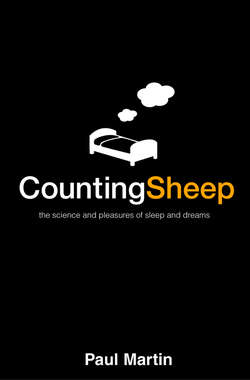Читать книгу Counting Sheep: The Science and Pleasures of Sleep and Dreams - Paul Martin - Страница 6
1 A Third of Life
ОглавлениеMan … consumes more than one third of his life in this his irrational situation.
Erasmus Darwin, Zoonomia (1801)
Sleep: a state so familiar yet so strange. It is the single most common form of human behaviour and you will spend a third of your life doing it – 25 years or more, all being well. When you die, a bigger slice of your existence will have passed in that state than in making love, raising children, eating, playing games, listening to music, or any of those other activities that humanity values so highly.
Sleep is a form of behaviour, just as eating or socialising or fighting or copulating are forms of behaviour, even if it is not the most gripping to observe. Most of the action goes on inside the brain. It is also a uniquely private experience, even when sharing a bed. When we are awake we all inhabit a common world, but when we sleep each of us occupies a world of our own. Most of us, however, have precious little awareness of what we experience in that state. Our memories of sleeping and dreaming mostly evaporate when we awake, erasing the record every morning.
Many of us do not get enough sleep and we suffer the consequences, often without realising what we are doing to ourselves. The demands of the 24-hour society are marginalising sleep, yet it is not an optional activity. Nature imposes it upon us. We can survive for longer without food. When our sleep falls short in quantity or quality we pay a heavy price in depressed mood, impaired performance, damaged social relationships and poorer health. But we usually blame something else.
Sleep is an active state, generated within the brain, not a mere absence of consciousness. You are physiologically capable of sleeping with your eyelids held open by sticking plaster, bright lights flashing in your eyes and loud music playing in your ears. We shall later see how science has revealed the ferment of electrical and chemical activity that goes on inside the brain during sleep, and how the sleeping brain operates in a quite different mode from waking consciousness. We shall see too how lack of sleep erodes our quality of life and performance while simultaneously making us more vulnerable to injuries and illness. Science amply supports William Shakespeare’s view that sleep is the ‘chief nourisher in life’s feast’.
What is sleep and what is it for? Why do so many people have such problems with it? Why do we dream? Although sleep forms a central strand of human and animal life it is still poorly understood and widely neglected. It is an inglorious example of familiarity breeding contempt. Sleep is so much a part of our everyday existence that we take it for granted. We are ignorant even of our ignorance. In 1758, Doctor Samuel Johnson summed it up like this:
Among the innumerable mortifications that waylay human arrogance on every side may well be reckoned our ignorance of the most common objects and effects … Vulgar and inactive minds confound familiarity with knowledge, and conceive themselves informed of the whole nature of things when they are shown their form or told their use … Sleep is a state in which a great part of every life is passed. No animal has been yet discovered whose existence is not varied with intervals of insensibility. Yet of this change so frequent, so great, so general, and so necessary, no searcher has yet found either the efficient or final cause; or can tell by what power the mind and body are thus chained down in irresistible stupefaction; or what benefits the animal receives from this alternate suspension of its active powers.
The scientists who do know something about sleep often bemoan society’s ignorance of it. They point to the vast gap between current scientific understanding of sleep, patchy though it is, and the practical benefits it could bring if that knowledge were absorbed and acted upon by society. Our collective indifference towards sleep has enormous and largely avoidable costs.
